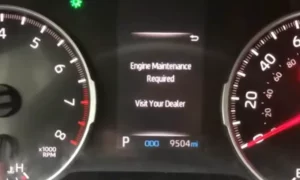Have you ever felt that moment of panic when your Toyota’s dashboard flashes a “Parking Brake Malfunction” warning? It’s not just frustrating—it can be genuinely concerning, especially if you’re parked on an incline. Toyota vehicles, despite their stellar reputation for reliability, aren’t immune to parking brake issues. Let’s dive into what causes these problems, how you can identify them early, and what steps you can take to keep your vehicle secure.
Common Symptoms of Toyota Parking Brake Malfunctions
When your Toyota’s parking brake starts acting up, it rarely happens without warning signs. Recognizing these early symptoms can save you from more serious problems down the road.
The most obvious indicator is the parking brake warning light illuminating on your dashboard. This bright red symbol usually appears alongside a “Parking Brake Malfunction, Visit Your Dealer” message on newer models. But there are subtler signs too.
Do you notice a slight rolling movement when parked on an incline, even with the parking brake engaged? Or perhaps you’re hearing unusual clicking or grinding noises when activating or releasing the brake? These are telltale signs that something’s not right with your parking brake system.
Many Toyota C-HR owners have reported experiencing EPB (Electronic Parking Brake) errors that prevent normal operation. In some cases, drivers have observed a “small jump” when shifting gears—a symptom of delayed actuator disengagement that’s particularly common in newer models like the 2025 Tacoma.
Top Causes of Toyota Parking Brake Failures
Mechanical Issues
Even with the shift toward electronic systems, mechanical problems remain common culprits behind parking brake malfunctions.
Cable Issues: In models with traditional brakes, cable degradation is a primary concern. These steel cables stretch over time, reducing tension and compromising holding power. This stretching accelerates in vehicles frequently parked on hills, as the cables endure greater tension.
Corrosion: Salt and moisture are enemies of your parking brake components. Vehicles driven in coastal areas or regions with harsh winters face accelerated corrosion risks. Rust can form on the cables, levers, and adjustment mechanisms, causing them to seize or fail. The 2016-2017 Prius models were particularly susceptible to this issue, leading to an official recall.
Brake pad wear: When brake pads wear down, the parking brake may need to travel farther to engage properly. This creates slack in the system that can lead to partial or complete failure. Regular brake inspections help catch this problem before it affects parking brake performance.
Electronic System Failures
Modern Toyotas with electronic parking brakes face their own set of challenges.
Software glitches: Like any computer-controlled system, EPBs can experience software bugs. In October 2022, Toyota recalled thousands of Tundra and Lexus NX vehicles due to a programming error that incorrectly activated fail-safe modes, rendering the parking brake inoperable.
Actuator motor failures: The small electric motors that apply your parking brake can wear out over time. Symptoms include unusual noises, slow engagement, or complete failure. These motors endure constant thermal and mechanical stress, especially in extreme climate conditions.
Battery-related issues: A weak battery can prevent proper EPB operation. Several C-HR owners have discovered that voltage drops below 12.4V can lead to parking brake malfunctions. One owner specifically reported an EPB error caused by a weak battery that couldn’t provide enough power to the servo motors.
Sensor problems: Modern parking brake systems rely on multiple sensors to monitor brake pad wear, actuator position, and engagement status. When these sensors fail or provide inaccurate data, the system may engage incompletely or display false warnings.
Recent Toyota Parking Brake Recalls
Toyota has issued several recalls related to parking brake issues across various models. Staying informed about these recalls is crucial for your safety.
2022 Tundra and Lexus NX Recall
In October 2022, Toyota recalled 83,725 Tundra and Lexus NX vehicles due to a critical parking brake issue. The problem stemmed from a software error that incorrectly activated fail-safe modes, leaving the parking brake either permanently engaged or unable to engage at all.
According to Consumer Reports, dealers resolved the issue with a simple 30-minute software update. This recall underscores the growing importance of software in modern vehicle safety systems.
2016-2017 Prius Recall
Earlier, Toyota recalled specific Prius models from 2016-2017 for a different parking brake issue. In this case, the parking brake cables could disengage due to insufficient securing clips, creating a rollaway risk. The fix involved installing improved clips to secure the cable properly.
Checking Your VIN
Not sure if your Toyota is affected by a recall? You can easily check by:
- Locating your 17-digit Vehicle Identification Number (VIN)
- Visiting Toyota’s official recall lookup page or the NHTSA’s safety issues page
- Entering your VIN to see any outstanding recalls
Remember, recall repairs are performed free of charge by authorized Toyota dealers.
DIY Troubleshooting for Parking Brake Issues
Before heading to the dealer, there are several checks and fixes you can perform yourself, depending on your comfort level with vehicle maintenance.
Basic Inspection Steps
Start with a visual inspection of accessible parking brake components:
- Check for visible damage to cables (in mechanical systems)
- Look for signs of leaking brake fluid near the rear wheels
- Inspect connectors and wiring (in electronic systems)
- Test the parking brake on a slight incline to assess holding power
Battery Health Check
As mentioned earlier, battery health is crucial for proper EPB operation. You can:
- Use a multimeter to check battery voltage (should be above 12.4V)
- Inspect battery terminals for corrosion
- Consider charging or replacing the battery if voltage is low
Many auto parts stores offer free battery testing services if you don’t have a multimeter.
EPB Reset Procedure
Some Toyota parking brake malfunctions can be resolved with a simple reset procedure:
- Ensure the vehicle is in Park with the engine running
- Press and hold the parking brake switch for 5-10 seconds
- Release the switch and test normal operation
This reset works on many models including the RAV4, Camry, and Highlander, though success rates vary depending on the underlying issue. For more detailed model-specific reset procedures.
Professional Diagnostic and Repair Options
When DIY approaches aren’t sufficient, professional diagnosis becomes necessary. Here’s what to expect.
Dealer vs. Independent Shop Services
Toyota dealerships offer specialized knowledge and equipment for diagnosing parking brake issues, particularly for newer models with electronic systems. Mechanics at dealerships have access to Toyota’s proprietary diagnostic tools and service bulletins.
Independent shops can often provide more competitive pricing, but ensure they have experience with your specific Toyota model, especially if it features an EPB system. Ask if they have the necessary diagnostic equipment before committing.
Typical Repair Costs
Repair costs vary significantly based on the underlying issue:
Electronic System Repairs:
- Software updates: $0-150
- Actuator replacement: $300-800
- Control module replacement: $400-1,200
Mechanical System Repairs:
- Cable adjustment: $75-150
- Cable replacement: $200-400
- Complete system overhaul: $350-700
Labor costs vary by region, but typically range from $120-180 per hour at dealerships and $80-140 at independent shops.
Toyota Model-Specific Considerations
Different Toyota models have distinct parking brake characteristics worth noting:
Camry and Avalon
These sedans transitioned to electronic parking brakes around 2018. Owners of 2018-2020 models have reported occasional software-related malfunctions that can be resolved with a system reset or software update.
The auto-engage feature on these models is particularly sensitive, sometimes engaging unexpectedly during routine stops. This isn’t a malfunction but a safety feature that can be adjusted through vehicle settings.
RAV4 and Highlander
Toyota’s popular SUVs have experienced their share of parking brake issues. The 2019-2021 Highlander Hybrid models in particular have had reported problems with premature actuator wear.
RAV4 models from 2019 onward feature an enhanced auto-hold function that works in conjunction with the parking brake, which can sometimes be misinterpreted as a parking brake malfunction when it’s actually operating as designed. A YouTube demonstration clarifies this feature’s normal operation.
Tacoma and Tundra
Toyota’s trucks have traditionally used drum-in-hat parking brakes, which are known for their durability but can be prone to adjustment issues. The newer Tundra models (2022+) with electronic parking brakes were part of the significant recall mentioned earlier.
Tacoma owners have specifically noted a characteristic “small jump” when releasing the parking brake and putting the vehicle in gear. While disconcerting, this is often normal behavior rather than a malfunction.
Prius and Hybrid Models
Toyota’s hybrid vehicles feature the most integrated parking brake systems. The regenerative braking systems work in tandem with the parking brake, creating unique diagnostic challenges.
Prius models from 2016-2017 were subject to the cable clip recall, but later models have proven quite reliable. The one exception is battery-related issues, as the 12V auxiliary battery in hybrid models can sometimes provide insufficient power for the parking brake actuators even when the main hybrid battery is fully charged.
Taking Action: Your Next Steps
If you’re experiencing a Toyota parking brake malfunction, here’s a practical action plan:
- Document symptoms (noises, warning lights, behavior on inclines)
- Check your VIN for any outstanding recalls
- Try the basic reset procedure if you have an electronic parking brake
- Test your battery health if you have access to a multimeter
- Schedule a diagnostic appointment if problems persist
Remember that parking on an incline with a malfunctioning parking brake is hazardous. Always turn your wheels toward the curb (downhill) or away from the curb (uphill) and consider using wheel chocks as a backup.
By understanding the common causes and solutions for Toyota parking brake malfunctions, you’re better equipped to address issues promptly and keep your vehicle secure in any parking situation.














